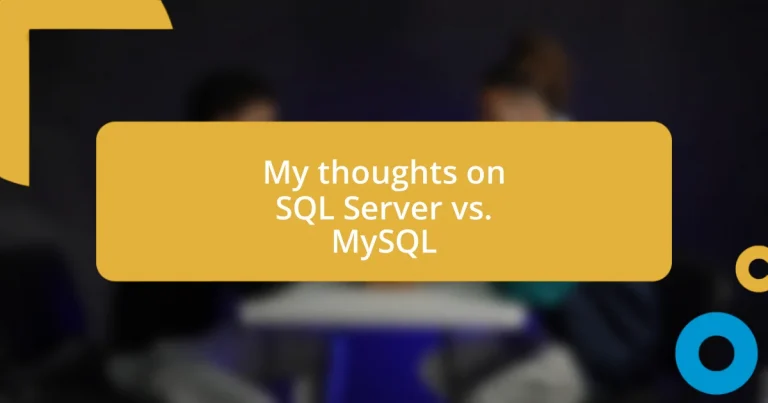Key takeaways:
- SQL Server offers robust security features and seamless integration with Microsoft services, making it ideal for enterprise-level applications and regulatory compliance.
- MySQL excels in replication support, open-source accessibility, and performance optimization, making it a preferred choice for dynamic web applications and startups.
- The choice between SQL Server and MySQL depends on specific project needs, with SQL Server being suited for complex transactions and MySQL for speed and scalability in cloud environments.
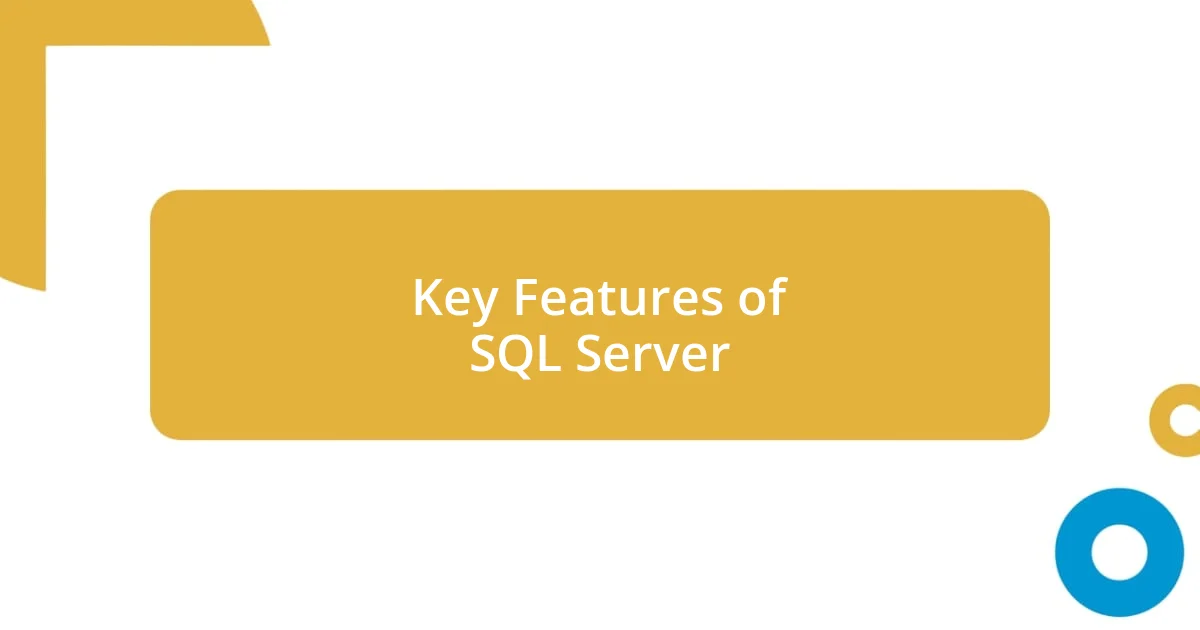
Key Features of SQL Server
One of the standout features of SQL Server is its robust security mechanisms. I remember when I first encountered its role-based security and data encryption capabilities—I was genuinely impressed. The way it ensures that sensitive data remains protected, even from internal threats, gave me peace of mind when handling critical information.
Another aspect that really draws me to SQL Server is its integration with other Microsoft services. I often find myself using it alongside tools like Power BI and Azure. The ability to seamlessly share data and insights across platforms truly enhances productivity. Isn’t it exciting to think about how interconnected our tools can be?
Lastly, I can’t overlook the importance of SQL Server’s built-in analytics tools. They provide powerful insights that help organizations make informed decisions. For instance, during a project I worked on, I used these tools to analyze user behavior data, which unveiled trends we’d never noticed before. It felt like unlocking hidden potential! Have you experienced a similar revelation with analytics in your work?
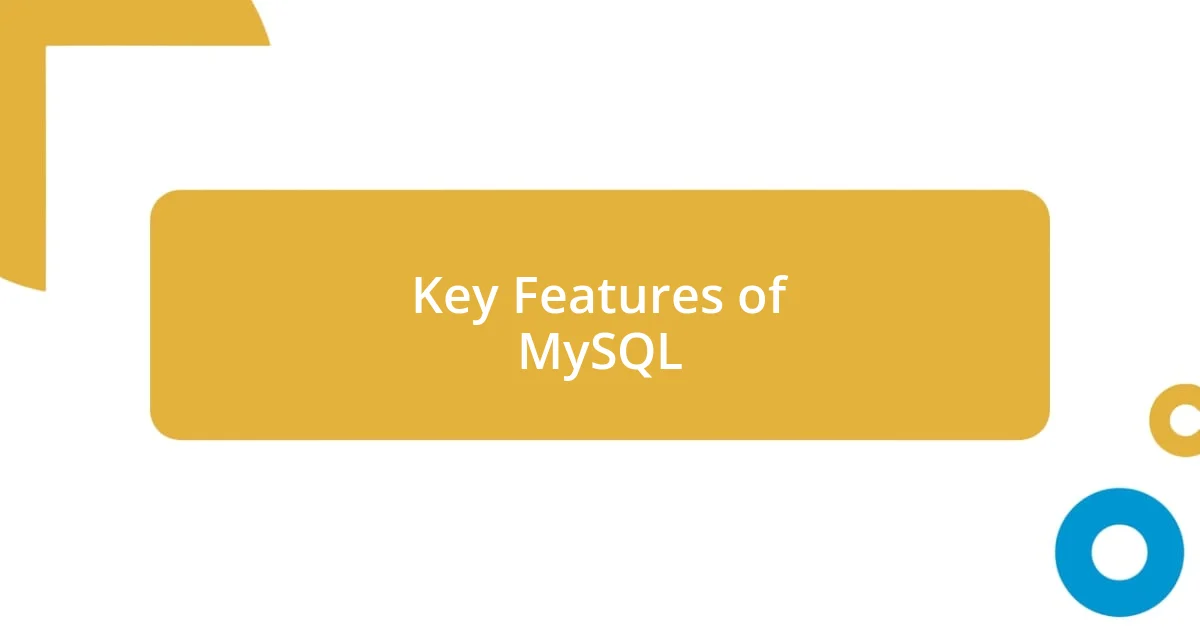
Key Features of MySQL
MySQL boasts a range of features that make it an appealing choice for developers and businesses alike. One feature that stands out to me is its incredible support for replication. I had a project where we needed to scale our database across multiple servers to ensure availability. Implementing MySQL replication was a game-changer. It allowed us to maintain data consistency while distributing the load—something that really made the team breathe easier during peak traffic times.
Here are some other key features of MySQL that I find noteworthy:
- Open Source: MySQL is free to use and has a community-driven model, which fosters a wealth of shared knowledge and resources.
- Cross-Platform Compatibility: It runs on various operating systems, including Windows and Linux, making it versatile for diverse environments.
- Performance Optimization: Its built-in query optimizer and support for various storage engines can significantly enhance performance.
- Strong Community Support: The active MySQL community offers excellent documentation and forums for troubleshooting and learning.
- Data Security: Features like user authentication and data encryption help protect sensitive information.
When I was working on a web application, I was truly impressed by MySQL’s support for transactions and its adherence to ACID principles (Atomicity, Consistency, Isolation, Durability). This feature reassured me that our data operations were reliable, especially during critical online transactions. It feels satisfying to know that I can trust MySQL to handle important data with consistency and integrity.
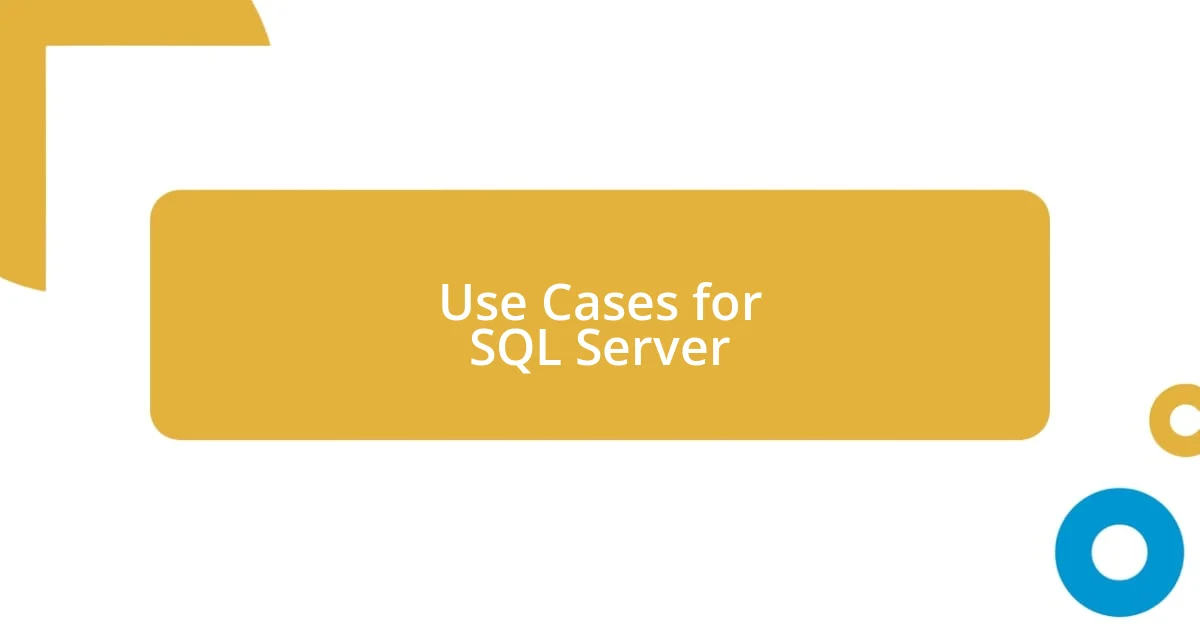
Use Cases for SQL Server
Certainly! When it comes to SQL Server, I’ve found it particularly effective in enterprise-level operations. One memorable project involved managing a large-scale real estate application where we needed to handle thousands of transactions daily. SQL Server’s advanced transaction handling and performance tuning features provided the reliability we desperately required. It made me realize how critical it is to choose a database that can scale seamlessly with business demands.
Moreover, SQL Server excels in situations that require complex data relationships. I recall a time when I was tasked with creating a data warehouse for an ecommerce client. Utilizing SQL Server’s ETL (Extract, Transform, Load) capabilities made it straightforward to pull data from various sources, transforming it into something meaningful for analysis. It was like piecing together a jigsaw puzzle, and seeing the complete picture emerge was incredibly rewarding!
Additionally, I value SQL Server’s compliance with various regulatory standards. When I worked on a healthcare project involving sensitive patient data, the built-in security features were invaluable. Knowing that we could leverage features like Transparent Data Encryption (TDE) gave me such a sense of reassurance—protecting patients’ privacy is always a top priority. Have you ever felt that level of responsibility on a project?
| Use Cases | SQL Server Strengths |
|---|---|
| Enterprise Applications | Scales well with high transaction volume and complex data management. |
| Data Warehousing | Strong ETL capabilities for integrating and analyzing large datasets. |
| Regulatory Compliance | Robust security features that support data encryption and security protocols. |
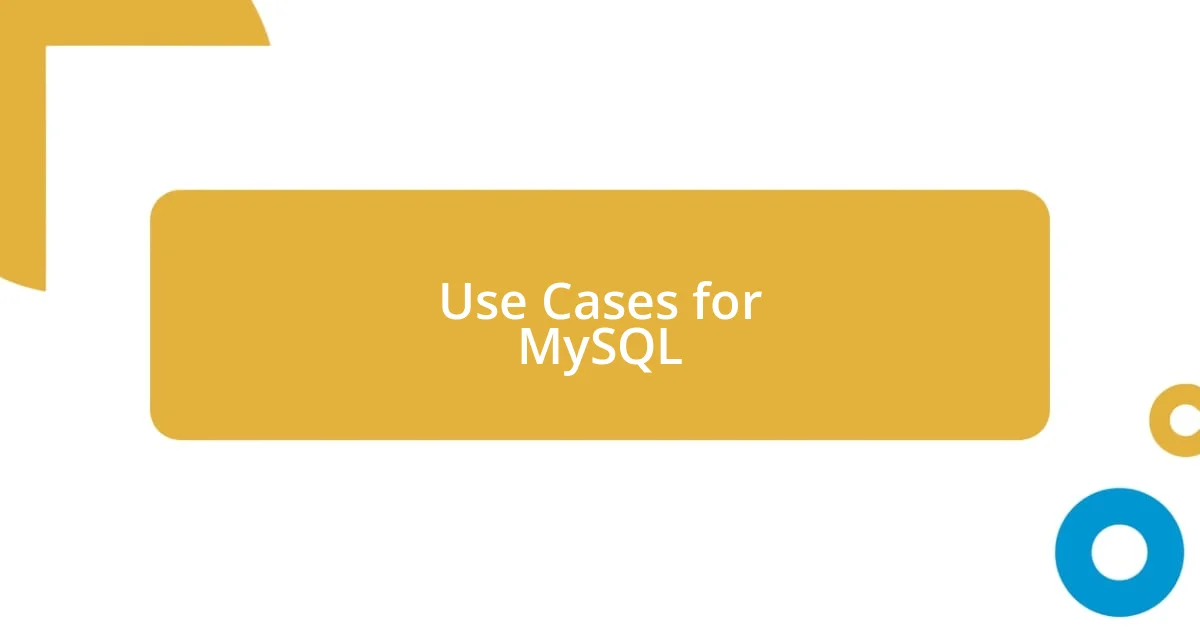
Use Cases for MySQL
Sure! My experiences with MySQL have revealed some fascinating use cases that can truly serve various needs.
One particular scenario comes to mind: I once helped a startup build a content management system (CMS) that required a fast and reliable database. MySQL was the perfect fit because of its speed and simplicity. The team was thrilled at how we could easily set up and manage the database, allowing them to focus on creating great content instead of getting tangled in database complexities. Have you ever found that the right tools can make all the difference in accelerating progress?
In the realm of web applications, MySQL shines in handling dynamic data efficiently. I remember a project for a social networking site where we needed quick, reliable access to user interactions. Thanks to MySQL’s robust indexing capabilities, we achieved lightning-fast query responses. It was exhilarating to see how user engagement soared, all because we chose a database that is designed for speed and performance.
Moreover, MySQL is a go-to choice for applications requiring a cloud-based solution. I’ve worked on a couple of e-commerce platforms hosted on cloud infrastructure, and using MySQL meant we could scale our database with ease. The flexibility and cost-effectiveness of MySQL in a cloud environment allowed us to keep overheads down while meeting increasing demands seamlessly. It just shows how essential it is to choose the right database technology to align with your growth strategy.
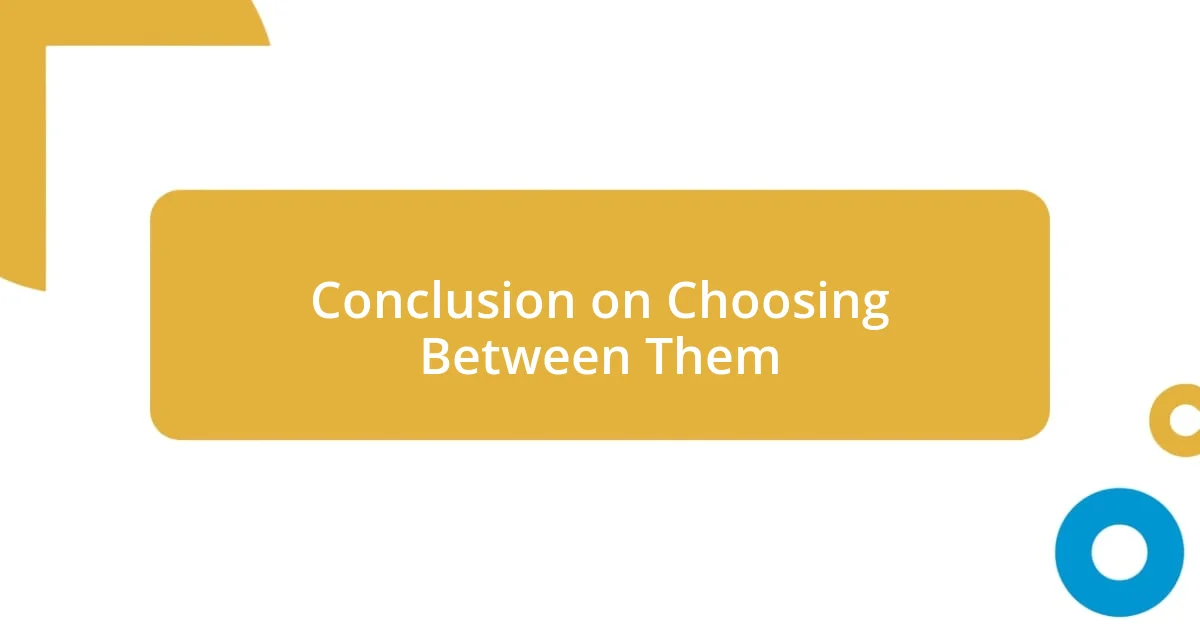
Conclusion on Choosing Between Them
When deciding between SQL Server and MySQL, it really comes down to the specific needs of your project. For instance, I once worked with a financial services company where SQL Server’s robust reporting features were indispensable. On the other hand, I’ve also seen startups thrive using MySQL because it fit their fast-paced, iterative development style perfectly—speed truly matters when you’re trying to get a product to market quickly.
Another factor to consider is scalability. I remember collaborating on a project with a global audience that required a database solution capable of handling fluctuating traffic volumes. MySQL’s ability to adjust effortlessly in a cloud environment gave us peace of mind, while SQL Server managed heavy enterprise loads like a pro. Isn’t it interesting how the context of your application can drastically affect the choice of database technology?
Ultimately, your choice hinges on balancing your project’s requirements with the strengths of each platform. While SQL Server shines in handling complex transactions and security, MySQL offers exceptional performance for web-based applications and startups. It’s about finding the right fit for your situation—have you reflected on what matters most for your projects?












